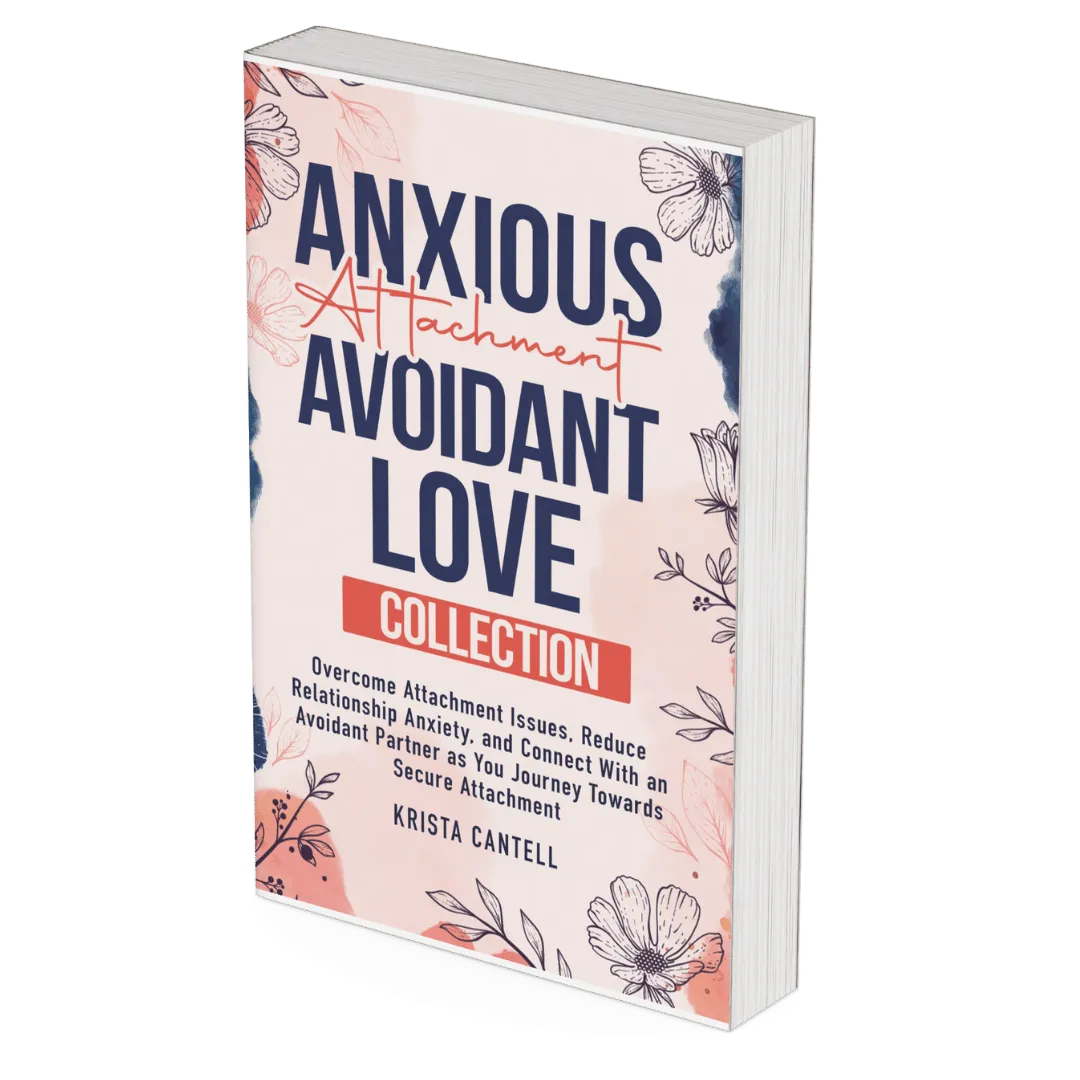Empowering Connections and Transforming Love
Attachment Theory Books for Lasting Love
Dive into our carefully curated selection of transformative books, enriching courses, and expert therapist recommendations, all designed to empower you with the knowledge and tools to build deeper, more fulfilling connections. Whether you're seeking to understand your relationship patterns, improve communication with your partner, or simply enrich your personal growth journey, Attachment Theory Books is here to light the way. Start your journey towards stronger, healthier relationships today!
FEATURED ATTACHMENT BOOKS THIS MONTH
Transform Your Love Life
Transform Your Love Life by embracing a secure attachment style with your partner. Discover the essence of enduring love through attachment theory, fostering deeper empathy, trust, and emotional connection. Our resources offer insights and practical tools to help you and your partner grow together, strengthening your bond. Whether starting anew or enriching an existing relationship, a secure attachment approach leads to a more fulfilling, loving partnership. Start your transformative journey with us and elevate the quality of your relationship.

Attachment Theory Books & Resources

Attachment Book Recommendations
Explore the transformative world of attachment theory with our handpicked book recommendations. Start your self-help journey with us, and unlock the secrets to a more fulfilling love life through the power of knowledge and self-discovery.
Connect with Therapists
Connect with the right support on your journey to healthier relationships. We offer easy access to a network of therapists specializing in attachment theory. Find the perfect match for your unique needs and start working towards a more secure, fulfilling partnership with expert guidance.

From The Attachment Theory Books Blog

Avoidant Personality Disorder vs. Avoidant Attachment Style
Avoidant Personality Disorder (AvPD) and Avoidant Attachment Style are two distinct yet related psychological phenomena that can have significant impacts on an individual's life. While both are marked by feelings of social inadequacy and a strong desire to avoid interpersonal relationships, they differ in their underlying causes and manifestations. Understanding the key differences between these two conditions is crucial for mental health professionals and anyone seeking to improve their social and emotional well-being.
Attachment theory provides a useful framework for understanding the origins of AvPD and Avoidant Attachment Style. According to this theory, individuals develop attachment styles based on their early experiences with caregivers. Those who experience consistent and responsive care tend to develop secure attachment styles, while those who experience neglect or inconsistency may develop insecure attachment styles, such as Avoidant Attachment Style. AvPD, on the other hand, is classified as a personality disorder and is characterized by a pervasive pattern of social inhibition, feelings of inadequacy, and hypersensitivity to negative evaluation.
While both AvPD and Avoidant Attachment Style involve a fear of rejection and a desire to avoid social situations, there are some key differences between the two. For example, individuals with AvPD may have a more generalized fear of social situations and may avoid them altogether, while those with Avoidant Attachment Style may be more willing to engage in social situations if they feel they can maintain control over the interaction. Additionally, AvPD is typically more severe and pervasive than Avoidant Attachment Style, affecting multiple areas of an individual's life rather than just their interpersonal relationships.

Understanding Attachment Styles and Personality Disorders
Attachment Theory Fundamentals
Attachment theory is a psychological theory that explains how humans form emotional bonds with others, particularly in the context of early childhood development. The theory was first proposed by John Bowlby, a British psychiatrist, and psychologist, in the 1950s. According to Bowlby, infants have an innate need to form a close emotional bond with a primary caregiver, usually the mother, in order to feel safe and secure. This bond is called attachment, and it serves as a foundation for emotional and social development throughout life.
Classification of Attachment Styles
Attachment styles are patterns of behavior and emotional responses that develop in response to the quality of early caregiving experiences. According to attachment theory, there are four main attachment styles: secure, anxious-ambivalent, avoidant, and disorganized. A secure attachment style is characterized by a sense of security and trust in others, while an anxious-ambivalent attachment style is characterized by a fear of abandonment and a need for constant reassurance. An avoidant attachment style is characterized by a tendency to avoid emotional closeness and a fear of intimacy, while a disorganized attachment style is characterized by inconsistent and unpredictable behavior.
Overview of Personality Disorders
Personality disorders are a group of mental health conditions characterized by persistent patterns of thought, feeling, and behavior that deviate from cultural norms and cause significant distress or impairment in social, occupational, or other areas of functioning. The American Psychiatric Association's Diagnostic and Statistical Manual of Mental Disorders (DSM-5) identifies ten distinct personality disorders, including avoidant personality disorder (AvPD).
AvPD is a personality disorder characterized by a pervasive pattern of social inhibition, feelings of inadequacy, and hypersensitivity to criticism or rejection. People with AvPD tend to avoid social situations and interpersonal relationships due to a fear of being rejected or ridiculed. They may also have low self-esteem, a tendency to be overly self-critical, and a fear of being disliked or judged by others.
In contrast, an avoidant attachment style is not a personality disorder but rather a pattern of behavior that develops in response to early caregiving experiences. While people with an avoidant attachment style may share some characteristics with those with AvPD, such as a fear of intimacy, they do not typically experience the pervasive and persistent social inhibition and self-doubt that are characteristic of AvPD.ike parenting, personal finance, or food, they might not be as relevant on Facebook as other types of posts.
If you are looking to make money online, affiliate marketing has become one of the most popular. Affiliate marketing allows bloggers to earn commissions by promoting products and services from others. The blogger does not need to own any product or service to be able to promote them. All he needs is a link to the product or service which he wants to promote.
Characteristics of Avoidant Attachment Style

Individuals with an avoidant attachment style tend to exhibit certain characteristics in their emotional regulation and intimacy, as well as in their childhood experiences and development.
Emotional Regulation and Intimacy
Avoidant attachment style is characterized by a fear of emotional intimacy and a tendency to avoid close relationships. Individuals with this attachment style often have difficulty expressing their emotions and may struggle with emotional regulation. They may also have a tendency to suppress their emotions and avoid situations that may trigger emotional responses.
Avoidant attachment style may also manifest as a fear of abandonment. Individuals with this attachment style may avoid close relationships or may sabotage relationships in order to avoid the possibility of being abandoned.
Childhood Experiences and Development
Avoidant attachment style is often the result of childhood experiences that have shaped an individual's emotional development. Children who experience neglect or rejection from their primary caregivers may develop an avoidant attachment style as a way of coping with the emotional pain and trauma.
Children who grow up in environments where emotional intimacy is not valued or encouraged may also develop an avoidant attachment style. They may learn to suppress their emotions and avoid close relationships as a way of protecting themselves from emotional pain.
In conclusion, individuals with an avoidant attachment style tend to exhibit certain characteristics in their emotional regulation and intimacy, as well as in their childhood experiences and development. Understanding these characteristics can be helpful in identifying and addressing avoidant attachment style in individuals.
Features of Avoidant Personality Disorder

Individuals with Avoidant Personality Disorder (AVPD) experience pervasive feelings of inadequacy, hypersensitivity to criticism, and fear of rejection. They tend to avoid social situations and relationships due to their fear of being judged or rejected. AVPD is a Cluster C personality disorder that affects approximately 2.5% of the general population.
Clinical Practice and Assessment
AVPD is diagnosed based on a thorough clinical assessment that includes a comprehensive medical and psychiatric evaluation. The assessment may include a review of the individual's medical history, a physical examination, and a mental status examination. The mental status examination may include an assessment of the individual's mood, affect, thought content, and perception.
The assessment of AVPD also involves a review of the individual's interpersonal relationships, including their history of intimate relationships. The therapist may also assess the individual's level of social anxiety, trust issues, and their ability to form and maintain relationships.
Impact on Relationships and Social Behavior
AVPD can have a significant impact on an individual's ability to form and maintain intimate relationships. Individuals with AVPD tend to avoid close relationships due to their fear of rejection and criticism. They may also have difficulty trusting others and may be reluctant to share personal information.
AVPD can also affect an individual's social behavior, leading to social isolation and loneliness. Individuals with AVPD may avoid social situations and may have difficulty making friends. They may also have difficulty expressing themselves in social situations and may appear shy or withdrawn.
In conclusion, AVPD is a personality disorder that can have a significant impact on an individual's ability to form and maintain intimate relationships and social connections. Clinical assessment and therapy can help individuals with AVPD overcome their fears and improve their social and emotional functioning.
Differentiating Factors and Therapeutic Approaches
Attachment vs. Avoidance in Relationships
One of the key differences between Avoidant Personality Disorder and an Avoidant Attachment Style is the way they approach relationships. Individuals with Avoidant Personality Disorder tend to avoid relationships altogether, while those with an Avoidant Attachment Style may have difficulty forming and maintaining close relationships.
People with Avoidant Personality Disorder often experience intense anxiety and fear of rejection, which can lead to social isolation. They may feel inadequate and avoid situations where they may be judged or criticized. On the other hand, individuals with an Avoidant Attachment Style may crave intimacy but struggle with feelings of vulnerability and fear of abandonment.
Treatment Strategies and Healing
Treatment strategies for Avoidant Personality Disorder and Avoidant Attachment Style are different, but both can benefit from therapy. Individuals with Avoidant Personality Disorder may benefit from cognitive-behavioral therapy, which can help them challenge negative thoughts and beliefs about themselves and others. Group therapy can also be helpful in building social skills and reducing social anxiety.
For those with an Avoidant Attachment Style, therapy can help them understand their attachment patterns and work on developing more secure attachment styles. Therapy can also help individuals with an Avoidant Attachment Style learn to communicate their needs and emotions more effectively, and develop more empathy towards themselves and others.
Overall, while Avoidant Personality Disorder and an Avoidant Attachment Style share some similarities, they are distinct conditions with different treatment approaches. With the right support and treatment, individuals with these conditions can learn to form healthier relationships and improve their mental health and well-being.
Our Service

Attachment Books
Explore the transformative world of attachment theory with our handpicked book recommendations. Start your self-help journey with us, and unlock the secrets to a more fulfilling love life through the power of knowledge and self-discovery.
Therapist Connect
Connect with the right support on your journey to healthier relationships. We offer easy access to a network of therapists specializing in attachment theory. Find the perfect match for your unique needs and start working towards a more secure, fulfilling partnership with expert guidance.






